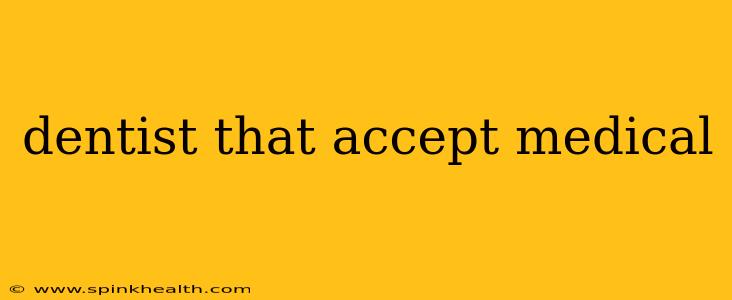Navigating the world of dental insurance can feel like traversing a maze. Finding a dentist who accepts your specific medical insurance plan often adds another layer of complexity. This isn't just about saving money; it's about accessing affordable, quality dental care. Let's unravel this together.
My name is Dr. Emily Carter, and I've spent over 15 years working in the dental field, witnessing firsthand the challenges patients face when trying to find in-network providers. This guide is based on my experience and aims to provide you with the tools and knowledge you need to find a dentist that accepts your medical insurance, ensuring you receive the dental care you deserve without financial strain.
What Does "Accepting Medical Insurance" Mean for Dental Care?
This often sparks confusion. Unlike regular dental insurance, which primarily covers preventative and restorative dental procedures, medical insurance sometimes covers dental care deemed medically necessary. This typically involves situations where dental issues directly impact overall health. Examples include:
- Treatment for oral infections: Severe infections requiring antibiotics or hospitalizations may be covered.
- Extractions related to systemic disease: If a tooth needs removal due to a medical condition like diabetes, coverage is more likely.
- Dental injuries from accidents: Trauma to the mouth often falls under medical insurance.
- Procedures for patients with certain disabilities or conditions: Individuals with cleft palates or other conditions requiring specialized care might have coverage.
It's crucial to understand that most routine dental procedures (cleanings, fillings, etc.) are not covered under medical insurance. Medical insurance policies vary greatly, and what one plan covers might differ significantly from another.
How to Find a Dentist Who Accepts My Medical Insurance?
This search often requires a multi-pronged approach:
1. Contact Your Insurance Provider Directly:
This is the most reliable method. Your insurer's member services department possesses the most up-to-date list of dentists in their network who accept medical coverage for dental procedures. They can provide you with a list of providers in your area.
2. Utilize Online Search Engines Strategically:
Searching online can yield results, but be precise. Try searches like:
- "Dentists near me that accept [Insurance Provider Name] medical insurance"
- "Medical insurance dental coverage [Your City, State]"
Remember to check individual dentist websites or call them to confirm if they accept your specific plan and type of coverage.
3. Check Your Insurance Provider's Website:
Many insurance companies maintain online provider directories. These directories allow you to search for dentists within your network. This is an excellent resource, ensuring you're not wasting time contacting dentists outside your coverage.
What if My Dentist Doesn't Accept My Medical Insurance?
Don't despair! Several options remain:
- Explore payment plans: Many dentists offer flexible payment plans to make dental care more accessible.
- Look into dental insurance: Consider purchasing a separate dental insurance policy to cover routine care.
- Seek care at a dental school: Dental schools often provide affordable care administered by students under the supervision of experienced dentists.
- Negotiate with your dentist: In some instances, you might be able to negotiate a payment plan or reduced fees.
Can I Use My Medical Insurance for Cosmetic Dentistry?
Generally, no. Cosmetic procedures like teeth whitening or veneers are rarely covered by medical insurance, regardless of the plan. These are considered elective procedures rather than medically necessary.
Does Medicaid Cover Dental Care?
Medicaid coverage varies by state. Some state Medicaid programs provide limited dental benefits, while others offer more comprehensive coverage. Check your state's Medicaid website for specific details on what's covered.
What Documents Do I Need to Provide?
When visiting a dentist who accepts medical insurance, bring your insurance card and any relevant medical documentation related to the dental issue, especially if it's medically necessary.
Finding a dentist who accepts medical insurance takes effort, but it's a worthwhile endeavor. By employing these strategies, you can increase your chances of finding affordable, quality dental care. Remember to be proactive, thorough, and persistent. Your oral health is crucial to your overall well-being, and accessing the appropriate care is a significant step towards a healthy and happy life.

